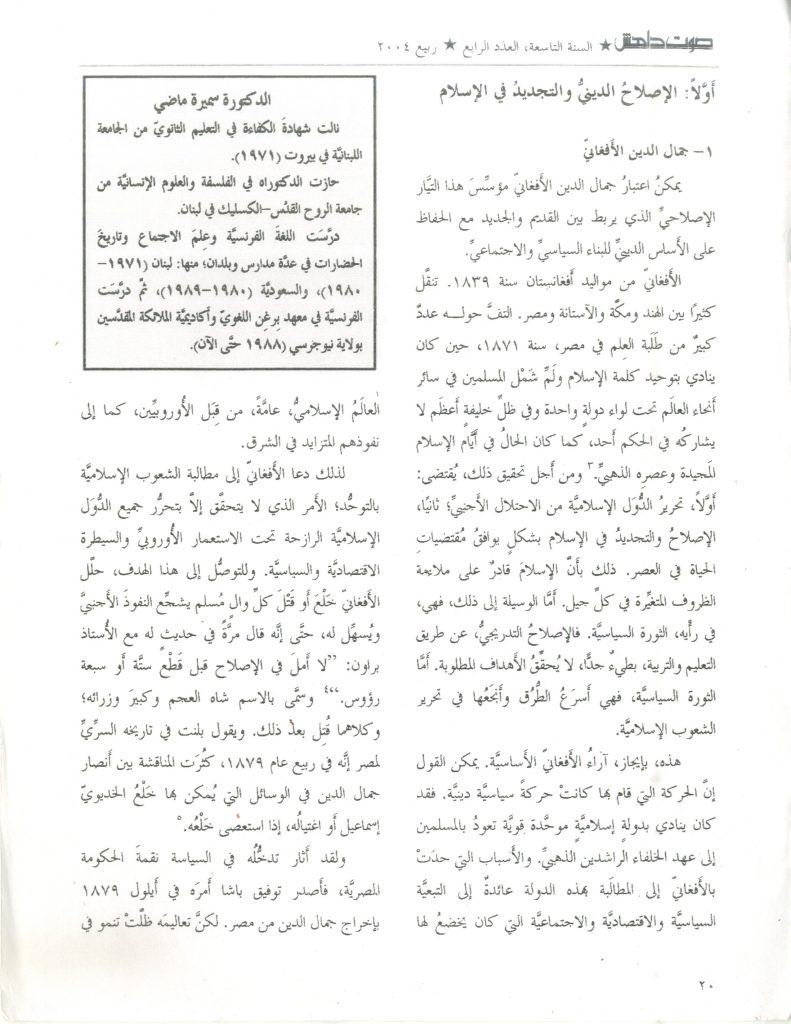
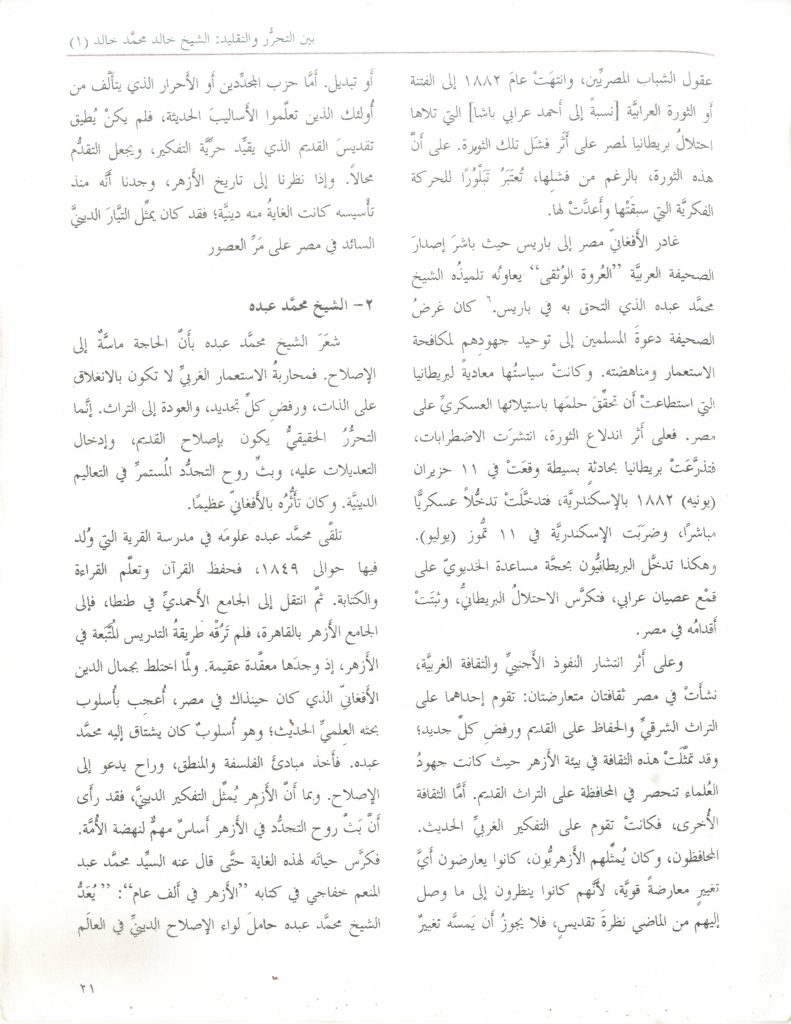
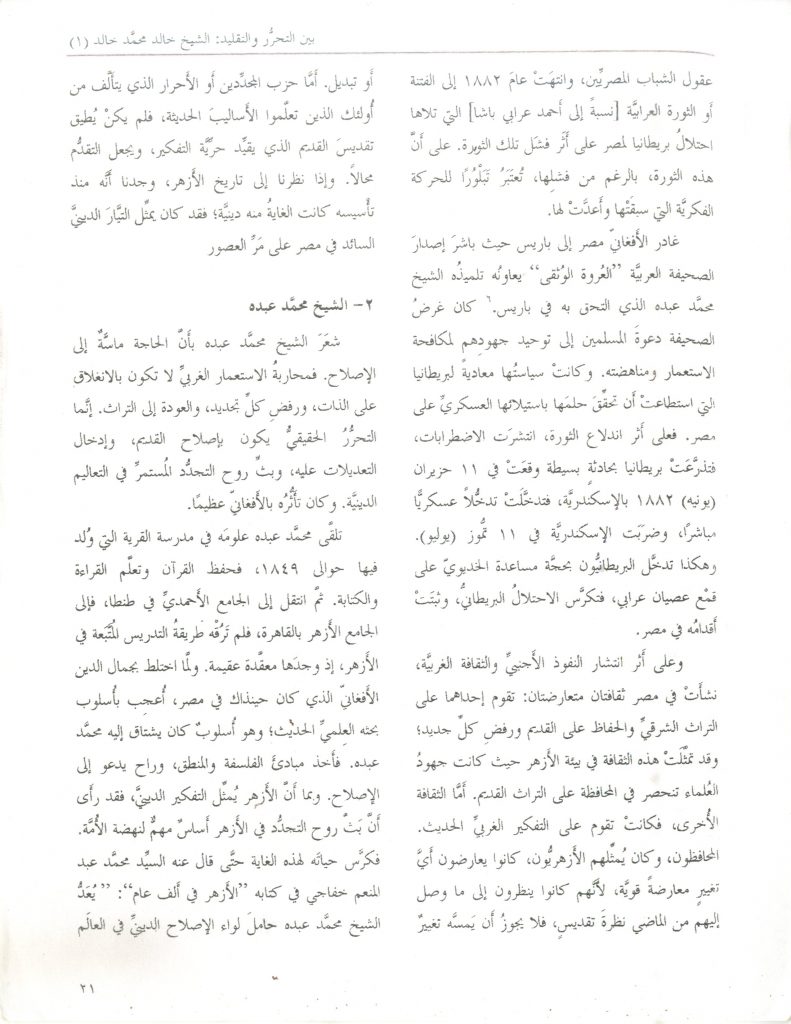
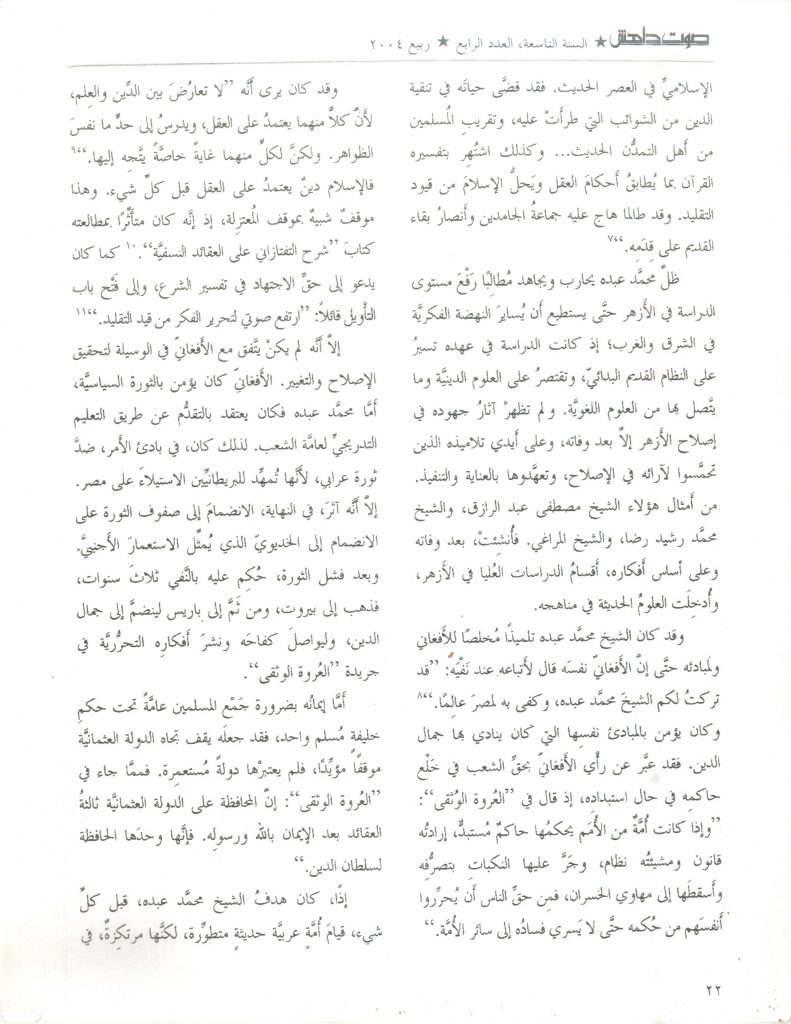
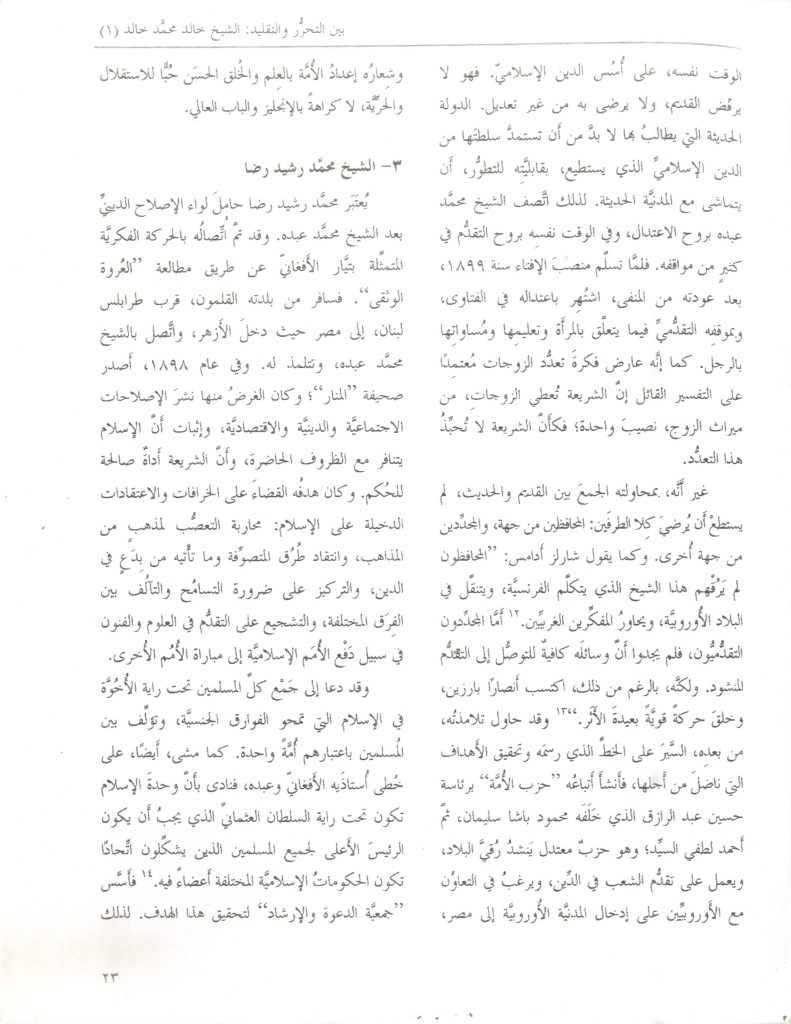

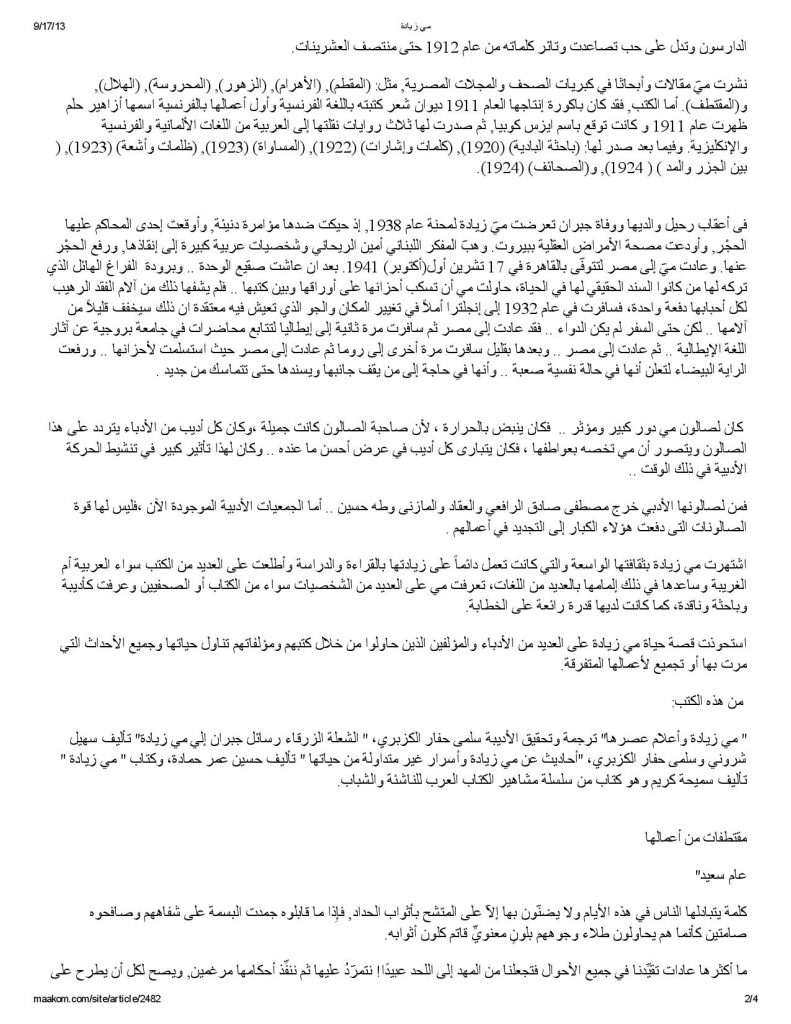
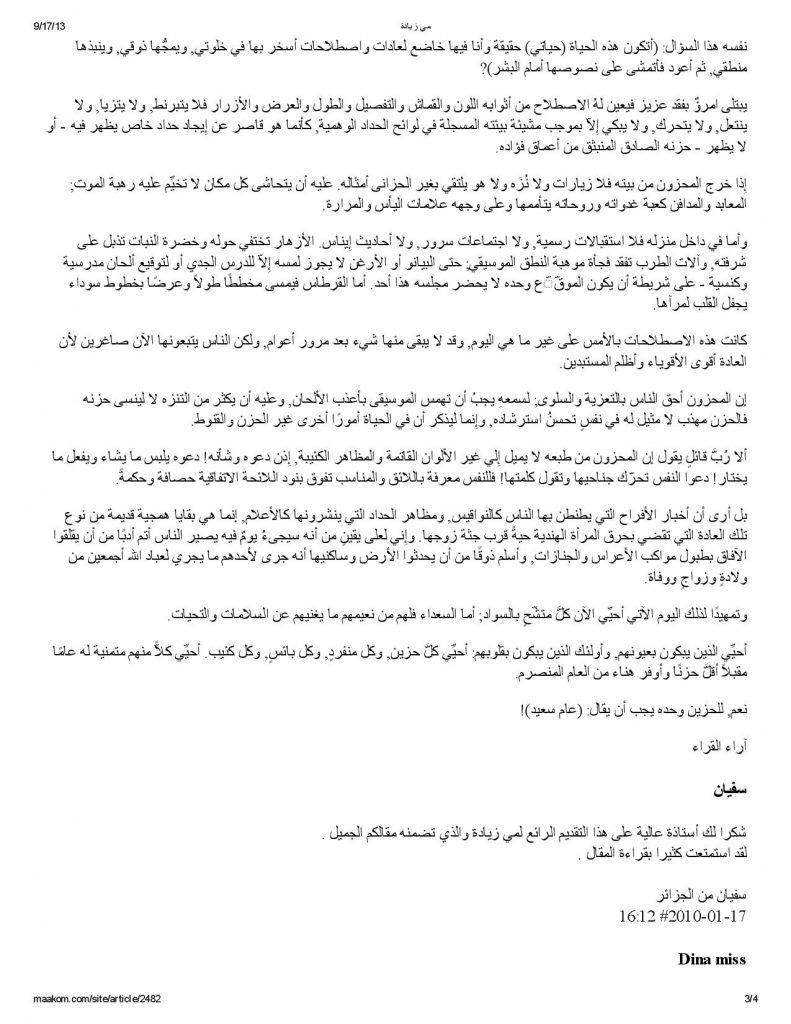
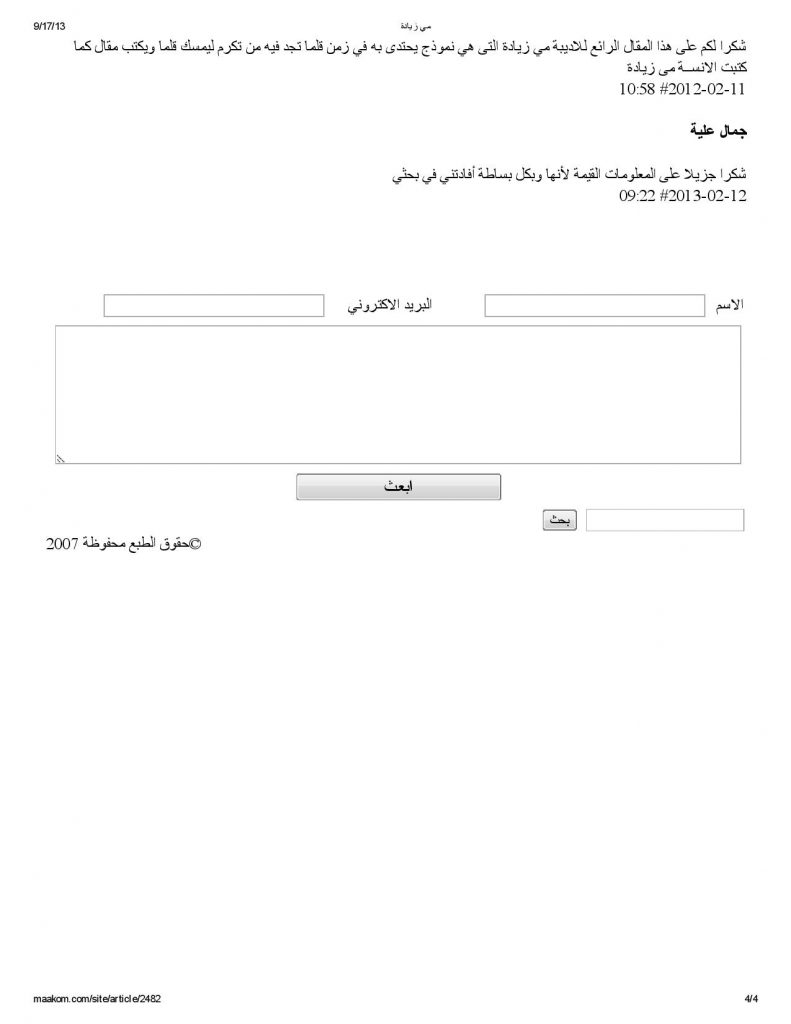
1. تراكيب وصفية متتابعة
This is a topic we dealt with earlier (see Lesson 2 Grammar Note 2). There are several constructions with جمل وصفية in this lesson, which will help us review this important construction.
a.
لقب يدلّ على أهمّيّته
اوّل معهد أنشئ خارج الإطر الديني
In both of these cases, the pronoun that refers to the head noun (in bold) is the subject of the verb in الجملتين الوصفيتين (underscored).
b.
عملان رئيسيان هما قاموسه … وموسوعته
Here الجملة الوصفية is an equational sentence which may not have occurred before, but which should present no problem; the resumptive pronoun is هما which is الجملة الوصفية مبتدأ .
One more point. The head noun has two modifiers an adjective رئيسيان and a sentence هما قاموسه … وموسوعته , without a coordinator. This is very common in Arabic and is no stranger to English. In fact as we will see presently more than two such modifiers with no coordinator can occur. But first,
c يستند الى اسبابٍ منها التاريخ واللغة الخ .
Here الجملة الوصفية is an equational sentence whose predicate is a prepositional phrase, and the resumptive pronoun is attached to the partitive prep. من . Hence the meaning of it: ‘reasons some of which are’.
Here are other examples:
صوتا فيه قوّةُ الرحمة
عُرف بخصائص منها حبّه لكلّ جديد
d. ألّف كتاباً عن باريس عنوانه “الابريز …” وصف فيه الحياة في فرنسا
3 2 1
Here we have three modifiers to the head noun كتاباً .
(i) عن باريس prep. phrase
(ii) عنوانه “الابريز” مضاف اليه )resumptive pr. (مضاف + ‘whose’
(iii) وصف فيه الحياة في فرنسا )resumptive pr. + prep.) ‘in which’
Here are other examples of multiple modifiers in a series
قبائل متعدّدة لكلّ منها رئيس يدعى الشيخ يخضع له افراد القبيلة
سوق قريبة تدعى عكاظ يبيعون فيها منتجاته
مدارس ذات طابع دينيّ خاص تسمّى كتاتيب يعلّم فيها القرآن
ألّف كتاباً مشهورا عن باريس يقرأ ه كل من يهمّه الأمر عنوانه “الابريز …” وصف فيه الطهطاوي الحياة في فرنسا
Notice that in addition to a series of modifiers for one head noun, it is possible to have within modifying units nouns that are themselves head nouns and are modified. Thus, the first sentence above then reads translates: (they were) numerous tribes to each of which there was a chief who was called “Sheik” and to whom every member of the tribe submitted.
A series of modifiers of various kinds (such as ( صفة، نعت سببي، اسم فاعل and a combination thereof without conjunctions can occur in attributive constructions, in predicates, and in جمل حالية, but not as مفعول لأجله.
Also, here are more examples of (i) above:
مدارس للبنات
شابّ من مستواها
برامج باللغة العربية
شغل مناصب من بينها منصب وزير التعليم He occupied positions among which is the position of Minister of
e أعظم عملٍ قام به
The resumptive pronoun is attached to a preposition which is obligatory in Arabic and part of the collocation قام ب ; the corresponding English verb does not have it.
امر آخر كنت داعياً من دعاته
Any problem? Can you come up with 2 sentences having structures like d. and e. ?
1. مُنْذُ/مُذْ
Like other adverbials of time and place مُنْذُ )and its less commonly used form (مُذْ is used as a preposition, followed by a noun or noun phrase, or a conjunction, followed directly by a sentence or a noun clause مؤوّل مصدر . Like حيثُ it is indeclinable. As head of its adverbial construction, it is used by itself (i.e. no preposition precedes or follows it) and follows the main clause it modifies, though it may precede it.
1. منذ as a preposition
As a preposition, منذ can be followed by a verb-initial sentence carries the meaning of ‘since’, ‘from a certain period of time until now’, ‘ago’/‘at a certain point in time’, as well as ‘from this time on’, depending on the context.
منذ عصر الجاهلية since pre-Islamic times
منذ تأسيسها since their founding
منذ سنوات عديدة اسكن هنا I’ve lived here for many years.
كنت اسكن هنا منذ عشرين عاماً I was living here twenty years ago.
سكنت هنا منذ سنة 1960 وحتى سنة 1980 I lived here from 1960 to 1980.
سأبدأ بالمشروع منذ الآن I will begin the project, as of now.
2. منذ as a conjunction
مُنْذُ can be followed by a verb initial sentence جملة فعلية , or a noun clause headed by أنْ مصدر مؤوّل , with the verb in the perfect. In both cases, they can be replaced with a مصدر صريح ‘verbal noun’
لم نَذُق طعم النوم منذ (انْ) وصلنا = منذ وصولنا We haven’t slept a wink (lit. tasted sleep) since we arrived/our arrival.
منذ (ان) بدأ القرن = منذ بدء القرن since the century began (the beginning of the century).
الانسان منذ (انْ) وُجد لا يعرف معنى الحُرّيّة Man, ever since he was created, has not known freedom.
3. منذ ….. و …..
As indicated above, the construction with منذ may also occur at the beginning of a sentence. As such, a striking feature is that it may be followed by a clause introduced by a و . Observe this sentence from the Basic Text:
ومنذ ذلك الحين وهي تحاول تشجيع … Since that time, they have been tying to encourage …
The implication here is “time went by since that time, with them (the governments) all the while trying to encourage …”, which would suggest that the و is واو الحال ‘the circumstantial و ’ .
2. معاني ما
You may well have come across the word ما in your reading and not been sure what it means; there are actually a number of different words spelled and pronounced ما with different meanings. Here are the most common:
1. النافية ما ‘negativeما ’ ‘not’
(1) ما النافية is used to negatea perfect verb though it is more common in MSA to use لم followed by the jussive. It however is frequently used to negate the perfect ofكان or one of its sisters:
ما كان صاحب مصنع. ‘He was not a factory owner.’
ما زال شابّا صغير السن
ما كِدنا نبدأ حتّى سمعنا صراخا
It should be noticed, though, that in a conditional sentence with لو occurring in first position, the perfect verb in جواب الشرط ‘apodosis’ cannot be negated with لم but obligatorily with ما :
لو عرفت ذلك لما زرته في بيته If I had known that, I would not have visited him in his home.
b. It is used, though rarely, to negate the imperfect indicative, but once again it very commonly negates the indicative of كان and its sisters and of كاد :
ما تزال مدينة القدس من اهمّ المدن المقدّسة عند المسلمين
ما تكاد تقرّر الزواج حتّى تغيّر رأيَها
c. It is used to negate an equational sentence; the predicate here is optionally introduced by بِ
ما هم كاذبون او ما هم بكاذبين. They are not lying.
It is so used when combined with الا ‘except’, where it means ‘only’
and with an equational sentence with inverted order (predicate-subject);
ما هي الا بنت صغيرة
ما له ايّ ُ عذر
It is so used when combined with الا ‘except’, where it means ‘only’,
and with an equational sentence with inverted order (predicate-subject);
ما هي الا بنت صغيرة
ما له ايّ عذر
ما بيدنا حيلة
When followed by من and an indefinite noun like لا of absolute negation, , it has the meaning of ‘none at all’, ‘no … whatsoever’, ‘absolutely none’:
ما من انسان مستعد ٍّ ان يفعل ذلك
ما من مبرِّر لهذه الأوضاع
d. It is used in idiomatic constructions like ما إنْ…حتى ‘no sooner…than…’ and ما هي الا…حتى… ‘it was only…before…’:
ما ان وصل الى اوربا حتى وقعت الحرب. ‘No sooner had he arrived in Europe than war broke out.’
وما هي الا لحظات حتى عرف انه يحبها. ‘It was only a few moments before he realized that he loved her.’
2. ما الاستفهامية ‘Interrogative ما’ ‘what?’
a. ما here is an interrogative pronoun which pronoun which asks a question about a thing (in contrast to مَن which asks a question about a person) and may serve as subject or predicate in an equational sentence:
ما النتيجة؟ ‘What is the result?’
ما اسمك؟ ‘What is your name?’
ما هذا؟ ‘What is this?’ (here the subject is هذا.)
As such it is often followed by the 3rd person pronoun which is always singular, masculine or feminine, especially when the following noun is definite:
ما هي النتيجة؟ ‘What is the result?’
ما هو الفرق بين هذين الحزبين؟ ‘What is the difference between these two parties
ما هي الكلمات التي تعلّمناها اليوم؟ ‘What are the words we learned today’
Note that: as the subject or object of a verb مادا is used:
مادا جرى؟ ‘What happened?’ مادا تريد؟ ‘What do you want?
In this case, a relative clause with الذي is also often used:
ما الذي جعلك تـُقدم على هذا العمل؟ ‘What made you undertake this work?
ما الذي قاله لك في غرفته؟ ‘What did he say to you in his room?
ما , and more commonly ماذا , may refer to a person when enquiring or wondering as to his position or nature, in the sense of ‘who might he be’:
انا استاذ ومربّي ولكن في الحقيقة ماذا أنا؟ I am a professor and an eduction, but truly what am I?
b. As a question word, ما may serve as object of preposition, in which case is written combined with the preposition and the ’alif اis usually shortened to ـَ فـَــتـْحة
عمّ تبحثون؟ ‘What are you searching for?’
الامَ ( + الى ما) ‘to what?’ علام‘on what?’ بِمَ ‘in what?’ لِمَ ‘for what?’ مِمَّ ‘from what?’ عَمَّ ((عن + ما ‘about what?’
فيمَ ‘in what?’
عَمَّ تبحثون؟ ‘What are you searching for?’
ما however, does not form compounds with prepositionals like عندَ ، بعدَ ، فوقَ الخَ, nor is it used as an interrogative with them.
c. Interrogative ما as well as مَن and ماذا are used in indirect questions:
سألني ما هو الشعر الحرّ؟ He asked me what free verse was.
أتعرف ماذا تريد انْ تفعل؟ Do you know what you want to do?
3. ما الاسم الموصول ‘Relative ما’
The indefinite relative pronoun ما includes its own antecedent: ‘that which; what’(See Lesson 2 Grammar Note 3 and Lesson 3 Grammar Note 5):
اشترينا ما كنا في حاجة اليه We bought what we were in need of.
خذ ما (هو) في جيبي Take what is in my pocket.
ما لي لك وما لك للأولاد What I have is yours and what is yours belongs to the children
باعوا كلَّ ما أنتجوا ‘They sold all that they produced.’
ندفع الآن ثمن ما نفعل(ه) We are paying the price of what we did.
A couple of points, observed in these sentences and others, concerning relative ما are worth repeating at this point:
1) Pronouns and verbs that agree with ما are in the m.s.
2) As is the case with other relatives, the referent pronoun in the relative clause is most often dropped:
a) when it is subject of a nominal clause and the predicate is a prepositional phrase. To the above examples, one might add the words بعد ، قبل ، عند ، بين :
انتظر الى ما بعد غروب الشمس
يعود تاريخه الى ما قبل الميلاد
حكم ما بين العامين 1952 و1970
b) when it is object of the verb in the relative clause as in the 4th and 5th examples above.
b. relative ما is often governed by prepositions such as في ، ب ، الى ، من ، عن (and in the case of من و عن the ن is assimilated to the م ):
اخبرني عمّا جرى لك أثناء زيارتك Tell me what happened to you during your visit.
لا تتدخّل فيما لا يعنيك Don’t poke your nose in what does not concern you.
اشار الى ما قاله الرئيس He referred to what the president said.
c. Often relative ما will follow an indefinite accusative adjective of extent or degree like كثيرا or a noun like عادةً and the whole phrase is best translated as an adverb:
قليلا ما نذكر اسمه We seldom mention his name.
كثيرا ما رأيته يعمل مساءً I have often seen him working in the evening.’
غالباً ما يكتب لي بالفرنسية He mostly writes me in French.
الانسان أحيانا ً ما ينسى ماضيَه Man often times forgets his past.
سرعان ما انتقل من موضوع الى آخر He in no time moved from one subject to another.
Or, how quickly he moved from …
These adjectives or nouns can be looked at as predicates of an underlying كان or حدث ‘happen, occur’ which has been elided.
d. Relative ما follows a number of prepositions, prepositionals, or nouns such as بِ in بِما ‘because’, كَ in كما ‘same as, just as’, بينَ as in بينما ‘while’, حينَ as in حينَما ‘when’, مثلَ as in مثلـَما ‘like’ and others (for which see Lexical Note 3 in this lesson) to function as subordinating conjunctions, with which ما is spelled either as one word like بينما or two in others like قدر ما:
بينما كنت أسير في احد الشوارع رأيت منظرا ً ازعجني While walking in one of the streets I saw something that upset me.
سنحاول مساعدتَه قدر ما نستطيع We will try to help him as much as we can.
e. Relative ما occurs in idioms where it is annexed to a verb, always in the 3m.s. such as قلـَّما ‘seldom, rarely’ , which is followed by a verb in the perfect or in the indicative, and طالما ‘as long as’, which may be followed by a verb in the perfect, by a nominal sentence, or by أنّ:
هذه كلمات طالما سمعته يردّدها These are words I have often heard him rrepeat.
سأزوره طالما هو هنا. I will visit him for as long as he is here.
ستستمرّ المفاوضات طالما أنّ الطرفين متعاونان The negociations will continue as long as the two sides are cooperating.
قلـّما نجدُ امثال هؤلاء الناس It is rare to find the likes of these people.
قلّما يسرن في المدينة ليلا ً Rarely do ladies walk downtown at night.
f. Finally, relative ما and مَن , followed and preceded by the same form of a verb, are used as a rhetorical device to indicate the indefinite nature of the action and/or the subject, as can be seen in the following examples:
قيل ما قيل
عاش من عاش ومات من مات
رأينا ما رأينا
Adverbial constructions with the relative pronoun ما: ريثما، وقتما، لاسيّما، طالما، قلّما، نادراً ما، كثيراً ما، قليلاً ما، اوّلَ ما، غالباً ما، ربّما، ايَّما، حالما، بقدرِ ما، كلّما، بينَما، فيما،ا،
4. ما المصدرية ‘Nominalizing ما’
Nominalizing ما introduces a clause, and serves to convert the clause into a nominal that is, an element having the functions of a noun. . Such a nominalized clause can serve also as a subject or object of a verb or object of a preposition or مضاف اليه (See Lesson 9 Grammar Note 1):
سلاها ما قاله تسلية عظيمة ‘What he said consoled her immensely.’
نعرف كل ما قلت لها ‘We know everything that you told her.’
بعدما وصل قابلوه بكل اكرام ‘After he arrived they received him with all honor.’
Nominalizing ما plus a verb is equivalent to a verbal noun:
- بعد ما وصلوا‘after they arrived’
بعد وصولهم ‘after their arrival’
5. ما الشرطيّة ‘conditional ما’ ‘whatsoever’
The verb following ما الشرطية and the verb in the result clause may be perfect or jussive, usually rendered into English as present:
ما يزرعْه الانسان يحصدْه Whatsoever a man sows, that shall he reap.
A number of words or particles are followed by ما and have conditional meaning. These include: مهما ‘whatever’, كيفما ‘however’, اينما ‘wherever’, كلـّما ‘as often as, every time that’, حيثما ‘wherever’ ايّما ‘whatsoever’ and others. These behave like conditional ما, but unlike it, may be postposed, that is follow the main clause. In this latter case, the verb may be perfect of jussive, but is often used in the indicative in MSA. In addition, the result clause with these words may be introduced by فَ or فإنّ
كلـّما رأيتها شعرت بالسعادة الكاملة Whenever I see her I feel perfectly happy.
اينما رأيتـَه وجدتَه/ تجدْه/ تجدُه/ فإنّك تجدُه مبتسما ً Wherever you see him, you will find him smiling.
مهما وجدوا من مَشَقّة فانهم سينجحون. Whatever hardship they will find, they will succeed.
مهما يكن من الأمر فالوضع سيتغيّر.Be it as it may/whatever the case may be, the situation will change.
When postposed, ما resumes its indefinite relative pronoun function:
يحصدُ الإنسان ما يزرعـُه
6. ما الكافـّة ‘the hindering ما’
When attached to إنّ or أنّ the noun that follows is no more put in the accusative but is in the nominative; it usually suggests a restrictive meaning. Thus:
انـَّما الشيطانُ عدو ٌّ لدود للانسان Truly, the devil is (or is nothing but) a deadly enemy to man.
This same ما when suffixed to كأنّ ولكنّ has the same effect.
7. ما الديمومة ‘Durative ما’ ‘as long as’ ‘Durative ما’ ‘as long as’
This occurs with a verb in the perfect tense:
ما دام حياً ‘as long as he is alive’
سأبقى في بيتي ما لم يَتسع الأمر I will stay at home so long as the situation does not dictate otherwise.
قام بواجبه ما استطاع الى ذلك سبيلا ً I performed his duty sor as long as he was able to
But it can also be followed by a nominal clause:
لن تحلّ َ المشكلة مابقيت الأوضاع على ما هي
سأواصل الاتّصال بك ما بقيت هنا
Durative ما occurs in well known expressions such as:
الى ما شاء الله for ever and ever, for all time
الى ما لا نهاية and infinitum, endlessly
8. ما التعجبية ‘Exclamatory ما’ ‘how…!’
This is followed by an invariable Form IV verb (called by Arab grammarians as افعال التعجّب ‘verbs of wonderment’) based on an adjectival root (this is called an “adjectival verb”) plus an object in the accusative (it is precisely because of this that Arab grammarians consider it a verb) :
ما اجملـَها How beautiful she is!
ما اروعَ هذا الشعرَ How splendid this poem is!
Instead of an object, an indefinite noun following مِن البيانية ‘explanatory مِن’ (see Lesson 3 Grammar Note 5 ) is sometimes used. Thus the second example may be seen as:
ما أروَعَه من شعرٍ معاصر How splendid a contemporary poem it is (lit. how splendid it is of a contemporary poem(
The object may take the form of a مصدر مؤوّل ب “أن” ‘:
ما أصعب أن يعيش الانسان بعيدا ً عن أهله How difficult it is for a man to live away from his family!
It may also take the form of a relative clause headed by the relative pronoun ما followed by noun clause with ‘an:
ما اسرع ان يرحّب البدويّ بالزائر وما أكثر ما يقدّمُ له الطعام والشراب
How quick is the Bedouin in welcoming a guest and how often he offers him food and drink.
9.او ما الإبهام ما المبهمة ’Indefinite ما’ ‘one, some, a certain; ever’
(1) It follows an indefinite noun where, if nunated, the /n/ of its nunation assimilates to the /m/ as ini:
يوماً ما ‘one day, some day’ الى حدٍ ما ‘to a certain extent’
لسببٍ ما ‘for some reason or other’ في مقالةٍ ما ‘in some article or other’
which are pronounced: yawmam maa, Haddim maa, sababim maa, and maqaalatim maa.
10. ما الزائدة ‘ Redundant ما / This ما is called “redundant” because it may be omitted without altering the basic meaning of the phrase. It occurs after the particle إذا as in إذا (ما) ذهبت ‘if you go’ (which suggests more vagueness), after only a few words as in عن قريب’soon’ vs. عمّا قريب ‘(pretty) soon’, and after دون as in:
فعل ما طـُلب منه دونما اعتراض ‘He did what he was asked to do without objection’.
11. ما also appears in combination with other forms, such as:
كما ‘as, just as, and also’ and كما ان ‘as, just as’ (for which see Lesson 5 Lexical Note 4). For ما…مِن and ممّا see Lesson 3 Grammar Note 3 and Lesson 5 Lexical Note 5, respectively).
